Most bird lovers cherish cockatiels for their playful antics, charming personalities, and ability to mimic sounds and tunes. However, there may be instances when your normally cheerful cockatiel starts hissing at you, which can be puzzling and concerning for any bird owner.
If you’re wondering ‘Why is my cockatiel hissing at me’, here’s your answer. It’s essential to remember that hissing is a natural behavior in cockatiels and can indicate a variety of emotions and situations. Cockatiels hiss out of fear, stress, or as a natural response to hormonal changes.
Let’s dive in and explore some of the reasons why your cockatiel might be hissing at you.
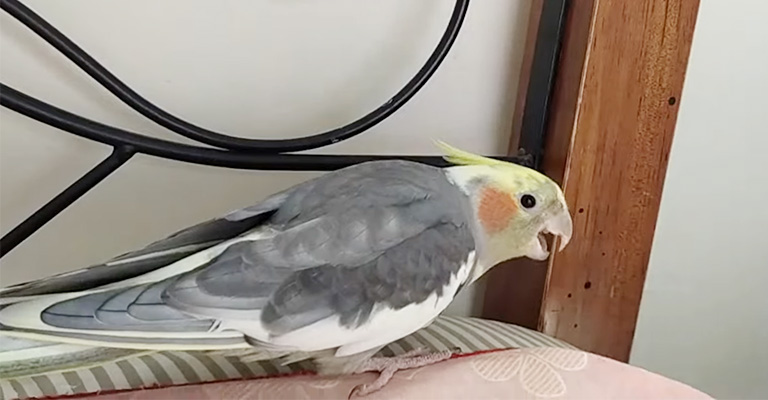
Why Do Cockatiels Hiss?
Cockatiels, like many other birds, may hiss as a form of communication or to express their discomfort or fear. Here are a few possible reasons why cockatiels may hiss:
Defense Mechanism
When cockatiels feel threatened or scared, they may hiss as a warning signal to deter potential predators or perceived threats. It is their way of saying, “Stay away, I’m not happy.”
Territory Protection
Cockatiels are naturally territorial birds. If they feel that their space is being invaded by another bird or even a human, they may hiss to establish boundaries and defend their territory.
Stress or Discomfort
Cockatiels may hiss if they are experiencing stress or discomfort. This can be due to various factors such as illness, pain, improper handling, or being in an unfamiliar environment. It’s their way of expressing their unease or dissatisfaction.
Breeding Behavior
Male cockatiels may hiss during breeding season as a part of their courtship behavior. It is a way to communicate with potential mates and establish their dominance or interest.
Vocalization Habit
Sometimes, cockatiels develop hissing as a vocalization habit. It may not always have a specific meaning or reason behind it, but rather something they do instinctively or as a result of their environment or past experience.
Aggression or Dominance
Hissing can be a sign of aggression or dominance in cockatiels. It may occur when two cockatiels are vying for dominance within the same space or when one bird is trying to assert its authority over another.
Feeling Threatened or Cornered
If a cockatiel feels trapped or cornered, it may hiss as a defensive response. This can happen when they are handled in a way that makes them feel uncomfortable or if they perceive a person or object as a threat.
Vocal Imitation
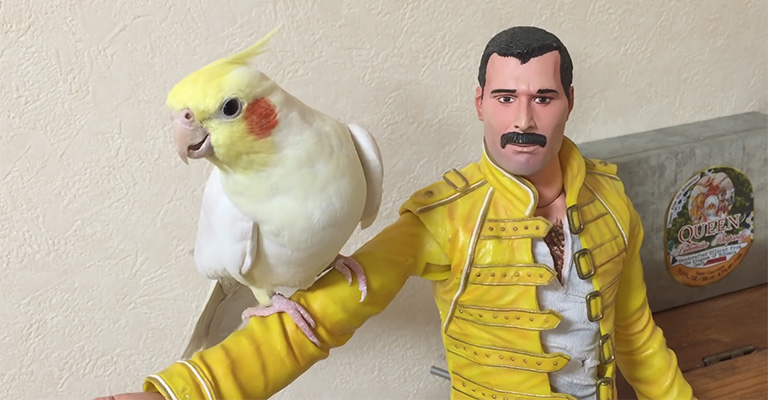
Cockatiels are known for their ability to mimic sounds and vocalizations they hear in their environment. If they have been exposed to hissing sounds, such as from other birds or even humans, they may imitate those sounds by hissing themselves.
Response to Pain or Discomfort
When a cockatiel is in pain or experiencing discomfort, it may hiss as a reaction. This could be due to an injury, illness, or any physical discomfort they may be experiencing.
Protective Parenting
Female cockatiels may hiss when they are protecting their eggs or young chicks. It is a way for them to warn potential threats to stay away and ensure the safety of their offspring.
If your cockatiel is frequently hissing, it’s essential to observe its overall behavior, body language, and the context in which the hissing occurs. This can provide clues to help you better understand the underlying cause and take appropriate action if needed.
Why Is My Baby Cockatiel Hissing At Me?
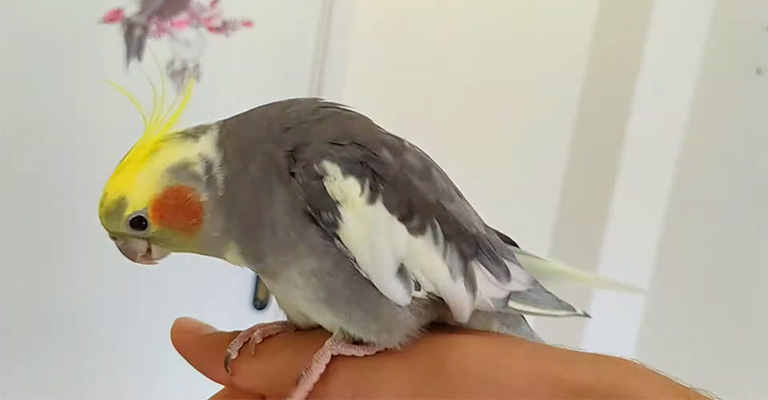
If your baby cockatiel is hissing at you, it may be displaying defensive or territorial behavior. Here are a few possible reasons for this behavior:
Fear or Lack of Socialization
Young cockatiels that have not been adequately socialized may perceive you as a threat and respond with hissing. If the bird has had limited exposure to humans or has had negative experiences, it may react defensively.
Protective Instincts
Cockatiels are naturally protective of their nests and offspring. If the baby cockatiel perceives you as a potential threat to its safety or feels its personal space is being invaded, it may hiss as a warning.
Hormonal Changes
As cockatiels mature, they go through hormonal changes, particularly during sexual maturity. Hormonal shifts can cause changes in behavior, including increased territoriality and aggression. Even young cockatiels can exhibit hormonal behaviors.
Illness or Discomfort
If your baby cockatiel is hissing and displaying other abnormal behaviors, it could be a sign of illness or discomfort. In such cases, it is important to monitor the bird’s overall health and consult a veterinarian if necessary.
Do Male or Female Cockatiels Hiss More?
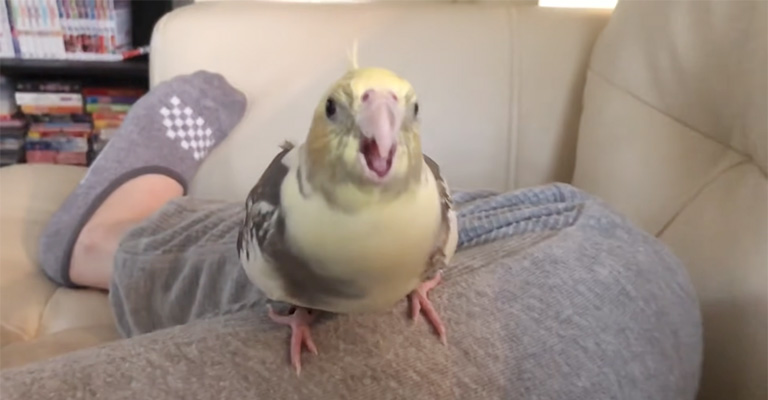
Both male and female cockatiels are capable of hissing, but the behavior can vary depending on individual temperament and the context in which they find themselves.
Cockatiels may hiss as a defensive or aggressive response when they feel threatened or want to establish dominance.
It’s important to note that hissing is just one form of communication in their repertoire, and they may employ other vocalizations and body language to express themselves.
When it comes to generalizations, some sources suggest that male cockatiels tend to be more prone to hissing than females.
However, this is not a hard and fast rule, as there are always exceptions. Each cockatiel has its own unique personality and can exhibit a range of behaviors.
Factors such as socialization, handling, and environment can influence their behavior as well. It’s best to observe and understand the behavior of individual cockatiels rather than rely solely on generalizations based on gender.
How to Stop My Cockatiel from Hissing at Me
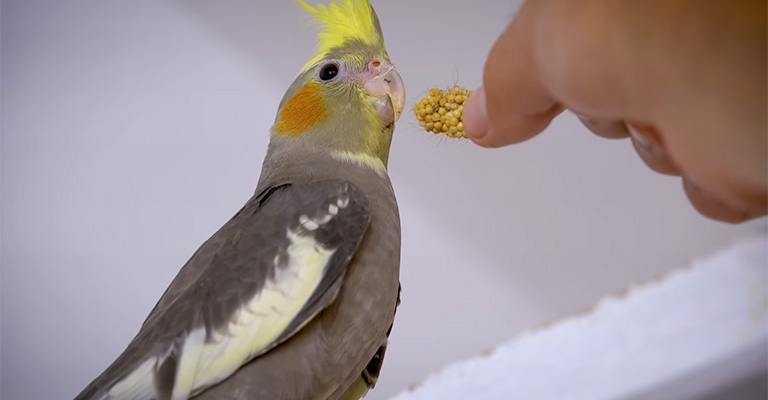
You can train the cockatiel to stop hissing and become more comfortable in its space. However, each cockatiel is unique, and it may take time to understand its specific needs and behaviors.
Building trust and a positive relationship with your baby cockatiel requires patience, consistency, and understanding.
Here’s what you can do-
Respect Personal Space
Give your baby cockatiel enough space and avoid invading its personal territory. Allow it to approach you on its terms and avoid forcing interactions.
Use a Soft, Calm Voice
Speak to your cockatiel in a gentle, soothing tone. Avoid sudden loud noises or aggressive behavior, as it can escalate the bird’s fear and defensive responses.
Avoid Punishment
Never punish or yell at your cockatiel for hissing or any other unwanted behavior. Punishment can exacerbate fear and aggression, making the situation worse.
Be Patient and Consistent
Building trust takes time, especially if your cockatiel has had negative experiences. Be patient, consistent, and maintain a routine when interacting with your bird.
Offer Distractions
Provide your cockatiel with engaging toys, such as puzzle toys or foraging toys, to redirect its attention and energy toward positive activities.
Environmental Enrichment
Create an enriched environment with branches, perches, toys, and swings to stimulate your cockatiel’s natural behaviors. This can help reduce stress and encourage healthy behaviors.
Positive Reinforcement
Reward desired behaviors, such as calmness, stepping onto your hand, or engaging in play, with treats, praise, or gentle petting. Positive reinforcement helps strengthen the bond between you and your cockatiel.
Seek Professional Help
If the hissing behavior persists or becomes aggressive, consider consulting an avian veterinarian or an experienced bird behaviorist. They can assess the situation more comprehensively and provide personalized guidance.
FAQs
Yes, hissing is a natural behavior in cockatiels. It can be a way for them to express fear, anxiety, territoriality, or discomfort. However, it’s important to observe the context and accompanying behaviors to understand the specific reason behind the hissing.
When a cockatiel is hissing due to fear or anxiety, it may display other signs such as crouching, fluffed feathers, dilated pupils, or an attempt to retreat or hide. These behaviors indicate that your cockatiel is feeling threatened or uncomfortable in its environment.
If your cockatiel hisses at you, it’s important to respect its boundaries and give it space. Avoid sudden movements or actions that may further stress the bird. Additionally, observe and identify the triggers that lead to hissing, and work on building trust and positive associations through patient and gentle interactions.
To prevent territorial hissing, it’s important to establish clear boundaries and respect your cockatiel’s personal space. Avoid invading its cage or perceived territory without a specific reason. Provide adequate mental and physical stimulation, such as toys and out-of-cage time, to prevent excessive territorial behavior.
If your cockatiel’s hissing behavior persists or is accompanied by other concerning symptoms like aggression, excessive feather plucking, loss of appetite, or unusual droppings, it’s advisable to consult an avian veterinarian or an experienced avian behaviorist.
Final Words
That was all about ‘Why is my cockatiel hissing at me’. cockatiels may hiss for various reasons, including fear, territorial behavior, mating season, illness, or lack of trust.
Understanding the underlying causes and addressing them with patience, positive reinforcement, and professional guidance can help mitigate the hissing behavior over time.
Remember, each bird is unique, and it may take time and effort to create a harmonious and trusting relationship with your cockatiel.